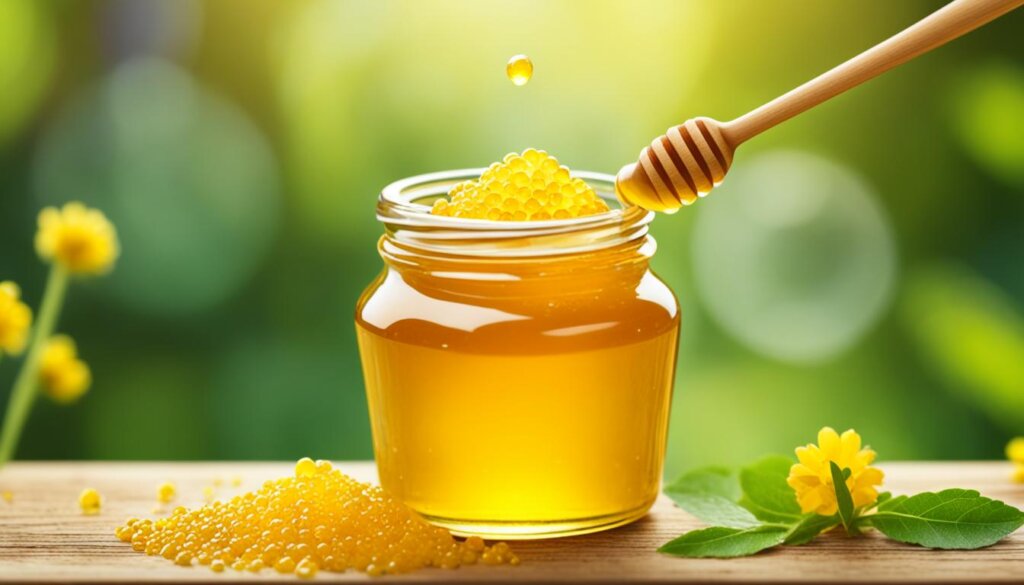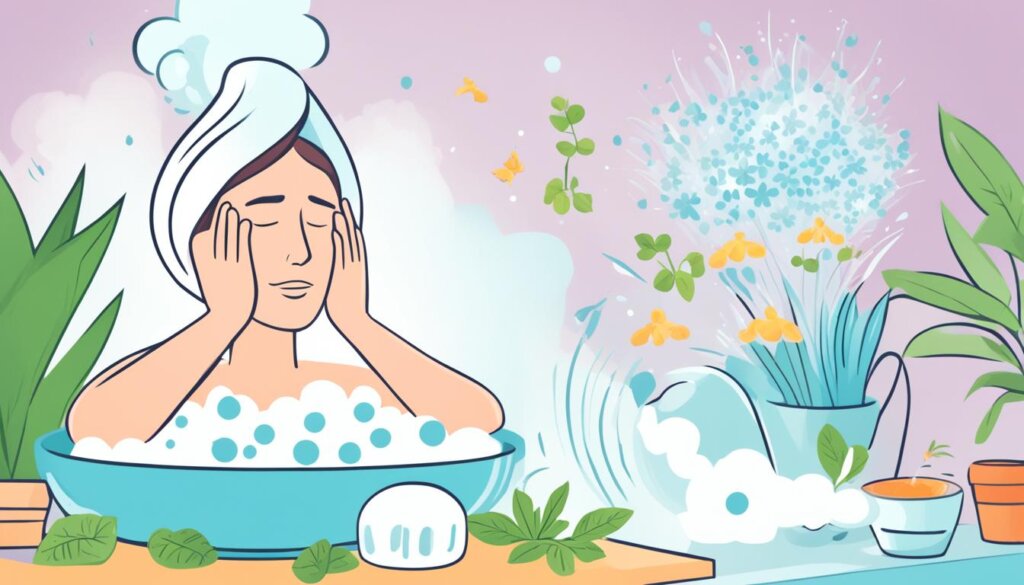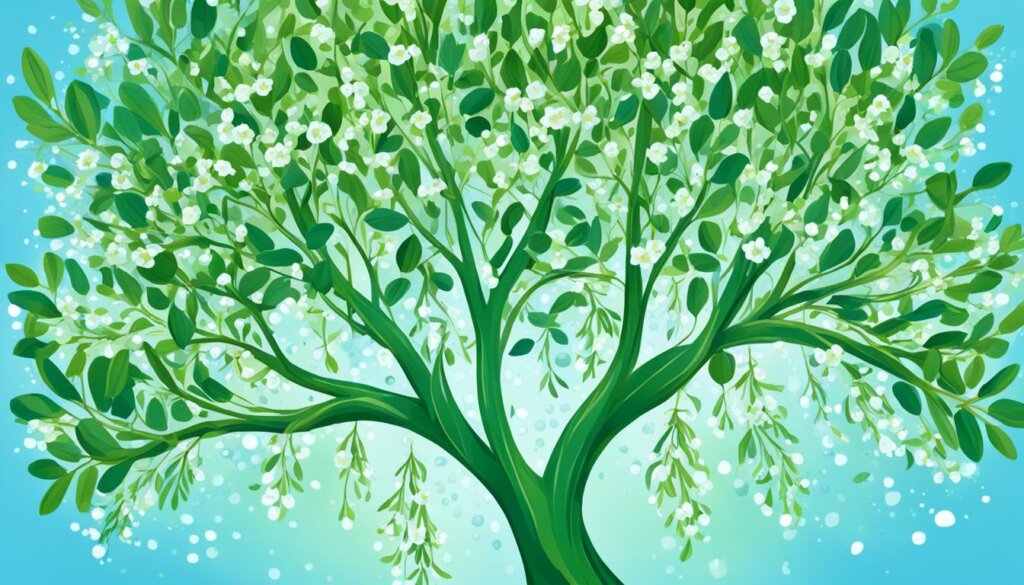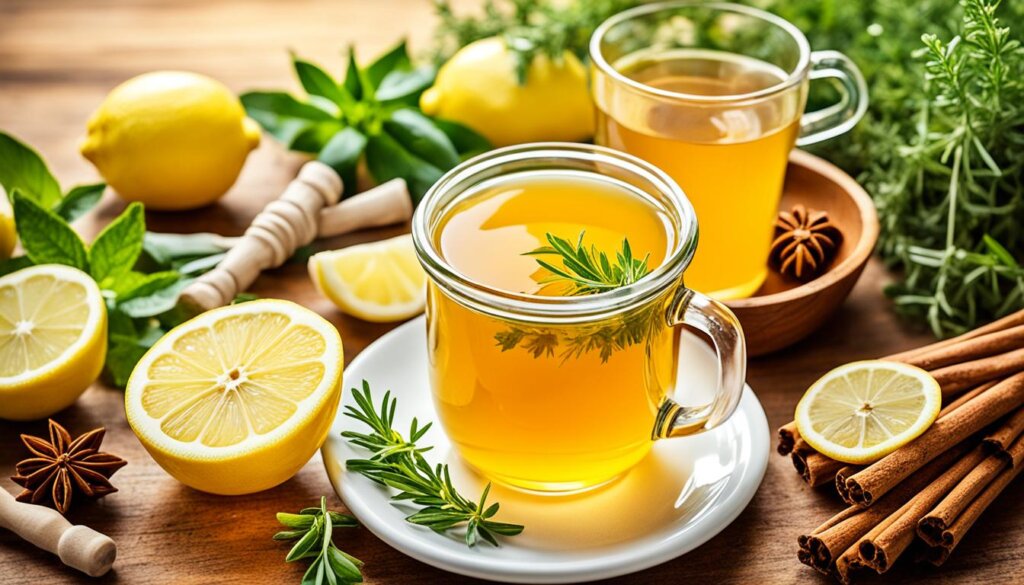FTC disclaimer: This post may contains affiliate links and we will be compensated if you click on a link and make a purchase.
Allergies affect many people around the world, causing issues such as a runny nose or anaphylaxis. People are looking for natural ways to reduce these symptoms instead of relying only on medicine. These ways include using common ingredients and methods for safe, effective allergy relief.
Key Takeaways
- Natural home remedies can provide quick relief for various types of allergies, including nasal, pet, and respiratory allergies.
- Home remedies often have fewer side effects compared to prescription allergy medications.
- Many natural remedies, such as honey, essential oils, and herbal infusions, can be customized to address individual allergy triggers.
- Certain natural supplements and nutrients, like quercetin and vitamin C, can help strengthen the immune system and reduce allergy symptoms.
- Incorporating a daily routine of natural allergy treatments can help manage symptoms and prevent flare-ups.
Understanding Allergies and Their Triggers
Allergies happen when the body overreacts to harmless things like pollen, dust mites, and certain foods. These things are called allergens. They can cause symptoms like a runny nose, itchy eyes, and even anaphylactic shock. Knowing the allergens and where they come from helps manage symptoms.
What are Allergies?
Allergies are when the body thinks something harmless is dangerous. This leads to the release of chemicals like histamine. These chemicals cause inflammation and other symptoms. Allergens that can start this reaction include pollen, dust mites, pet dander, and mold spores.
Common Allergens and Their Sources
- Pollen: Pollen from trees, grasses, and weeds can trigger allergies. This causes sneezing, itchy eyes, and more.
- Dust Mites: Dust mites are tiny bugs in bedding, pillows, and furniture. They cause itchy eyes and throat, a runny nose, and can make asthma worse.
- Pet Dander: Pet dander comes from pets’ hair, skin, and saliva. It can lead to reactions from breathing it in, getting it in your eyes, or touching your skin.
- Mold: Mold can also make allergies worse. It causes nasal congestion, sneezing, and other symptoms.
- Food Allergens: Eight foods cause most food allergy reactions in the U.S. These include cow’s milk, peanuts, and wheat.
Knowing common allergens helps people manage their symptoms. It lets them reduce exposure and find relief. Learning about allergy triggers is the first step to finding ways to cope with this health issue.
Benefits of Natural Home Remedies for Allergies
If you’re looking for safe and effective relief from allergies, natural home remedies might be just what you need. They offer several benefits. These can help you handle allergies better with fewer side effects.
Safety and Fewer Side Effects
Natural remedies for allergies are safer to use. Many allergy medicines can have bad side effects, like making you sleepy or causing a dry mouth. Natural options are kinder to your body. They help without causing these problems.
Customizable Solutions
Natural home remedies can be made just for you. They are not like medicines that are the same for everyone. You can adjust natural treatments to deal with your specific allergies. This makes sure you get the best help for your situation.
Strengthening the Immune System
Natural allergy cures can also boost your immune system. This is important for fighting off allergies. These remedies help your body guard against allergens. They could even make your symptoms less severe over time.

Studies show that using things like honey, stinging nettle, probiotics, and quercetin-rich foods can really help allergy sufferers. They can also improve your immune system.
By choosing natural remedies, you can make your allergies more manageable. This leads to a life with fewer sneezes and more fun.
Honey: A Sweet Solution for Local Pollen Allergies
Do you have local pollen allergies? Maybe you’ve heard about a sweet solution: local honey. It’s said that eating local honey might make you less sensitive to the pollen making you sneeze.
Yet, scientists are not all in agreement. Some say local honey does help, but others disagree. They think it won’t make you less sensitive to pollen.
In a test, 40 people with pollen allergies ate local honey with medicine. They felt better over time than those who didn’t have the honey. This showed some promise. In another study, 66 people with pollen allergies took quercetin for four weeks. They had less itching, sneezing, and better sleep.
How well local honey works might depend on how close it is to where the pollen comes from. For instance, folks near the Malaysian rainforest saw fewer symptoms after trying their local honey.
As for how much to eat, it varies from person to person. The idea is to start with 1-2 teaspoons of local honey daily. Then, you can increase it slowly to gauge your reaction.
Make sure your honey is the right kind. Raw, unprocessed, and unfiltered is best. It has more good bacteria, enzymes, and pollen than the regular honey you find in stores.
Remember, local honey might not fix all your allergy troubles. It could be a helpful part of a plan to deal with allergies. But it’s wise to speak to a healthcare pro for the best advice.

“There is no evidence supporting the claim that honey can relieve seasonal allergy symptoms. The pollen collected by bees to make honey is different from the pollen causing allergy symptoms in humans.”
– Dr. Dave Stukus, professor of clinical pediatrics
Steam Therapy: Clearing Nasal Passages
Nasal congestion is a frustrating allergy symptom. Luckily, steam therapy can ease this. Inhaling steam soothes nasal passages. This makes breathing easier.
Essential Oils for Enhanced Benefits
Adding essential oils like eucalyptus or peppermint to the steam boosts its power. These oils are natural decongestants. They clear your nose by reducing inflammation.
Steam inhalation is great for colds or sinus infections. Clinical trials show mixed results, but many feel better. It can reduce symptoms such as headache and throat irritation.
But, be careful with steam. Prolonged use may cause burns, especially in kids. Always use a safe method, like an electric steam inhaler. Limit sessions to 10-15 minutes.
Using steam and oils regularly helps with allergies. Always check with a doctor first, especially if you’re ill.

Herbal Remedies: Nature’s Antihistamines
Looking for ways to ease allergy symptoms naturally? Herbal remedies are a top pick. Plants like nettle, peppermint, and chamomile have been calming allergies for ages. These herbal antihistamines can be made into a tea. This tea is a soothing solution, offering a natural way to lessen allergy issues.
Nettle is famous for fighting inflammation and stopping histamine release. This helps with a stuffy nose, sneezes, and itching. Peppermint has menthol that opens airways and cools. Chamomile is great for peace in the airways, which may cut down allergy symptoms.
These natural remedies are often kinder to us than typical allergy meds. Plus, you can tweak them to fit your needs best. Figuring out the right mix can really help with your personal allergy issues.
We do need to learn more about how these herbs can help us over time. But it’s smart to think about using them in your allergy plan. Just first check with a doctor to make sure they’re safe for you.
Herbal Remedy | Potential Benefits for Allergies |
|---|---|
Nettle | Anti-inflammatory properties, blocks histamine release |
Peppermint | Menthol content can help clear nasal passages |
Chamomile | Soothing effects on the respiratory system |
Quercetin | Antihistamine and anti-inflammatory properties |
Butterbur | May have antihistamine effects, but some extracts can be harmful |

“Herbal remedies offer a natural way to manage allergy symptoms, allowing you to find customized solutions that work best for your individual needs.”
Eucalyptus Oil: A Powerful Decongestant
Looking for natural ways to fight allergy symptoms? Eucalyptus oil is your answer. It’s known for fighting inflammation and congestion, easing your allergy troubles.
The main part of eucalyptus oil, eucalyptol, helps clear mucus in your chest and nose. This makes it easier to breathe and relieves sinus pressure. A 2009 study showed eucalyptus oil works well for sinus problems compared to a fake treatment.
Eucalyptus oil doesn’t stop there. It also fights off germs from bacteria, viruses, and fungi. Breathing it in through a diffuser or steam bath can naturally ease your allergies.
But, be careful with eucalyptus oil. It’s not for kids under 3 months, says the American Association of Naturopathic Physicians. Breathing in too much oil can make you dizzy or give you a headache. Don’t swallow it, it’s not safe.
To use eucalyptus oil safely for allergies, put a few drops in a diffuser or mix with another oil for skin use. Always talk to a doctor before you use it, especially if you’re sick or taking medicine.

Eucalyptus oil is a strong ally against allergies. But, it’s best to use several methods together. Try steam, herbs, and keeping your home clean to fight allergies better.
Nourishing Your Body: Nutrients and Supplements
Managing allergies can be easier when you eat the right nutrients. Certain natural compounds, like quercetin and vitamin C, can fight allergy symptoms well.
Quercetin: A Natural Antihistamine
Quercetin is a bioflavonoid from various plants, like apples and tea. It acts as a histamine blocker naturally, which can control allergic reactions. Eating foods high in quercetin is a good way to ease allergy symptoms without synthetic medicines.
Vitamin C: Reducing Histamine Levels
Vitamin C also helps with allergies. This vitamin is an antioxidant that can lower histamine in your body. You can get plenty of it from fruits and veggies like oranges and broccoli. Taking extra vitamin C can help your immune system fight allergies off.
Taking these supplements and nutrients daily can naturally help with allergies. But, always talk to a doctor before adding new supplements. This ensures they are safe for you and your health.

“Eating the right nutrients could change how you deal with allergies. Including natural antihistamines like quercetin and vitamin C in your diet might help you avoid using only synthetic drugs.”
Nutrient | Benefits for Allergies | Food Sources |
|---|---|---|
Quercetin | Natural histamine blocker, regulates histamine production and release | Apples, berries, grapes, tea, tomatoes, leafy greens |
Vitamin C | Powerful antioxidant, helps reduce histamine levels in the body | Citrus fruits, bell peppers, kiwi, broccoli |
Nasal Irrigation: Flushing Out Allergens
Nasal irrigation can change the game for those with allergies. The neti pot is popular. It uses a saltwater solution to clean the nose. This method takes out allergens, lowers congestions, and gives comfort.
Using saltwater in the nose can help with many issues. These include allergies and colds, even COVID-19. But, you must be careful to have a good, safe experience.
The water you use for this is very important. Use water that is distilled, sterile, or boiled. This keeps bad stuff out of your nose. Neti pots and other special containers are good for this.
Making sure your device is clean is crucial. Always follow how to clean it from the maker. Plus, good habits are a must for safety.
Over-the-Counter Saline Nasal Sprays for Adults | Over-the-Counter Saline Nasal Sprays for Children |
|---|---|
Arm & Hammer Simply Saline Nasal Mist | Boogie Mist Baby Saline Nasal Spray |
Ayr Saline Nasal Mist | Burt’s Bees Kids Gentle Saline Spray and Drops |
Xlear Nasal Spray | NeilMed Pediamist Pediatric Saline |
Vicks Sinex Saline Nasal Spray | Vicks Sinex Children’s Saline Nasal Spray |
Saline sprays are easy to use for sinus problems. You can get them for both adults and kids. They’re safe for most people but ask a doctor first if you’re pregnant or if the child is very young.
You have many ways to do nasal irrigation, like using a neti pot or spray. This can really help with managing allergies. It clears allergens from your nose, making it easier to breathe.
“Nasal irrigation can be a game-changer for allergy sufferers, providing natural sinus relief by flushing out allergens and promoting healthier nasal passages.”
Creating an Allergy-Proof Home Environment
Making your home safe from allergies is key. Use natural cleaning methods and cut down on things that make you sneeze. This way, your home becomes a calm place that keeps allergens away.
Natural Cleaning Solutions
Try vinegar and baking soda for cleaning. They get rid of allergens well, without adding more chemicals. These two can clean dust, pet hair, and other pesky allergens from your home.
Reducing Indoor Allergens
To lower allergens, use special covers on your bed and wash your sheets often in hot water. Also, keep the air dry with a dehumidifier to stop mold. It’s good to keep the humidity around 50% to fight dust mites and mold, which are big indoor allergy causes.
Think about improving your air system with asthma and allergy friendly filters too. These can trap almost all the tiny allergen particles. Also, clean regularly, choose simple carpets, and don’t use too many rugs. These steps bring more comfort and less allergy troubles at home.
These simple steps lead to a better living area for those with allergies. It makes living easier and more enjoyable, even if you have allergies. So, start making your home an allergy-proof place today.

Other Home Remedies for Allergies: A Daily Routine
Setting up a daily plan with home remedies works well for fighting allergies. Many get allergic to pollen, especially in spring, summer, and fall. These seasons have a lot of pollen and mold.
Symptoms of allergies range from congestion to itchy eyes and low energy.
Steam therapy is a great part of an everyday allergy relief plan. Breathing in steam can clear your nose by breaking up mucus. Putting some eucalyptus or peppermint oil in the steam makes it even better. Using a neti pot or saline rinse for nasal irrigation helps a lot too. It can make moving mucus out easier by 30%.
Drinking herbal teas everyday can also help with allergies. Stinging nettle, perilla, and butterbur are known to ease allergic rhinitis. Ginger and yarrow are other great options for nasal and sinus problems.
By adding these remedies to your daily life, you can stay ahead of allergy symptoms. This way, your body is better at fighting off allergy triggers.

“Prevention is key for seasonal allergy relief. Removing plants that cause reactions, avoiding allergens, and keeping windows shut to dodge pollen can help a lot.”
Seeking Professional Medical Advice
Using home remedies to manage allergies can help, but they’re not a doctor’s replacement. In the U.S., about a third of adults deal with allergies. It might be because of the seasons or certain foods. To figure out what’s going on and which treatments are best, it’s smart to talk to a healthcare provider. They can check you out and make sure any remedies are safe and work well. Many adults and kids have allergies, especially to things in the air.
If you see a doctor, they can figure out what’s making you feel bad. They might suggest specific things to help with your allergies, like medicine or not being around certain things. Some allergy medicines can make you sleepy. Doctors also know it’s not good to use nose sprays for too long. Your doctor will make a plan that fits your needs, whether it’s with drugs or other treatments.
It’s super important to see a doctor if your allergies get very serious, like if you might have anaphylaxis. Anaphylaxis is very dangerous and can cause coma or even death. Signs might include your face getting big, finding it hard to breathe, or feeling a strange tingle. For anaphylaxis, quick help is vital. Using an EpiPen is a must, but also keeping the person relaxed and their airway clear.
Doctors can make sure your allergy plan is the best it can be. They can suggest things to avoid or give you shortcuts to feel better, like certain medicines. This way, you can live without worrying too much about your allergies.

Even though home treatments are good at times, nothing beats seeing a doctor when allergies are serious. They help you figure out what you’re allergic to and the best ways to treat it. Allergies can really slow you down, but a doctor can make things much better. They’ll help you enjoy life more by keeping allergies under control.
Conclusion
Home remedies are great for allergy relief. They have fewer side effects and you can pick what works best for you. Using things like honey, steam, herbs, and certain vitamins can help you fight allergies. But, always talk to a doctor for the best plan just for you.
Medicines from the store can also help with allergies. But, mixing these with home remedies can give you even more benefits. It’s all about finding what natural ways work for you. This helps make you healthier and happier.
Dealing with allergies might mean trying a few things at once. Home remedies play a big part in this mix. When you put your health first, handling allergies gets easier. You can then enjoy each season without so much trouble.
FAQ
What are the benefits of using natural home remedies for allergies?
Natural home remedies have several benefits. They are safe and have few side effects. You can also tailor these solutions to fit your needs. They help strengthen your immune system, which is key to fighting allergies.
How can honey help with seasonal allergies?
Local raw honey might lessen seasonal allergy symptoms. Bees make this honey from local plants. The pollen in the honey could help your body get used to allergens over time.
How can steam therapy help with allergy symptoms?
Breathing in steam can open your nose and relieve stuffiness. You can boost the steam’s benefits by adding oils like eucalyptus or peppermint. They help even more with congestion.
What are some effective herbal remedies for allergies?
Nettle, peppermint, and chamomile have calming effects on allergies. You can make a tea with them. This tea acts like a natural antihistamine to lessen symptoms.
How can eucalyptus oil help with allergy relief?
Eucalyptus oil fights inflammation and clears mucus. Use it in a diffuser or in steam to ease your breathing. This can reduce how allergies affect you.
What nutrients can help with allergies?
Quercetin and vitamin C can reduce the body’s allergic response. Quercetin manages histamine, and vitamin C lowers it. Both can cut down allergy symptoms.
How can a neti pot help with allergy relief?
A neti pot clears out allergens and congestion naturally. You fill it with salt water to wash your nasal passages. It can help with allergy symptoms.
What steps can I take to create an allergy-proof home environment?
Make your home allergy safe by cleaning with natural products. Use covers to block allergen spread. Wash bedding well and manage moisture to decrease mold.
When should I consult a healthcare provider for my allergies?
Home remedies are helpful, but they may not be enough. Talk to a doctor for a proper diagnosis. They can help you find the best treatment, including using home remedies safely.








